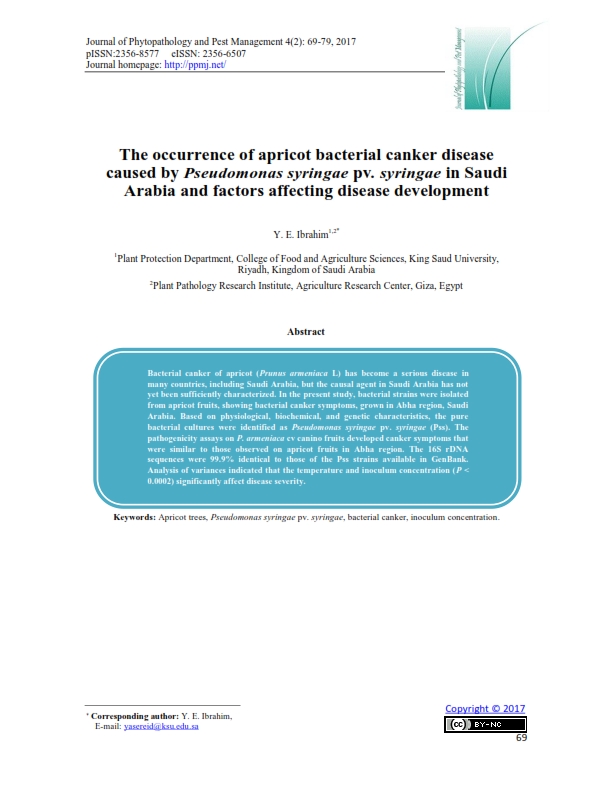The occurrence of apricot bacterial canker disease caused by Pseudomonas syringae pv. syringae in Saudi Arabia and factors affecting disease development
Keywords:
Apricot trees, Pseudomonas syringae pv. syringae, bacterial canker, inoculum concentration.Abstract
Bacterial canker of apricot (Prunus armeniaca L) has become a serious disease in many countries, including Saudi Arabia, but the causal agent in Saudi Arabia has not yet been sufficiently characterized. In the present study, bacterial strains were isolated from apricot fruits, showing bacterial canker symptoms, grown in Abha region, Saudi Arabia. Based on physiological, biochemical, and genetic characteristics, the pure bacterial cultures were identified as Pseudomonas syringae pv. syringae (Pss). The pathogenicity assays on P. armeniaca cv canino fruits developed canker symptoms that were similar to those observed on apricot fruits in Abha region. The 16S rDNA sequences were 99.9% identical to those of the Pss strains available in GenBank. Analysis of variances indicated that the temperature and inoculum concentration (P < 0.0002) significantly affect disease severity.Metrics
Metrics Loading ...

Published
2017-08-27
How to Cite
Ibrahim, Y. (2017). The occurrence of apricot bacterial canker disease caused by Pseudomonas syringae pv. syringae in Saudi Arabia and factors affecting disease development. Journal of Phytopathology and Disease Management, 4(2), 69–79. Retrieved from https://ppmj.net/index.php/ppmj/article/view/123
Issue
Section
Research Articles
License
Authors who publish with Journal of Phytopathology and Disease Management agree to the following terms:
- Authors retain copyright and grant the journal right of first publication with the work simultaneously licensed under a Creative Commons Attribution License that allows others to share the work with an acknowledgement of the work's authorship and initial publication in this journal.
- Authors retain copyright and grant the journal right of first publication with the work simultaneously licensed under the Creative Commons Attribution-Non Commercial License (CC BY-NC). This allows others to share the work with an acknowledgement of the work's authorship and initial publication in this journal.
- Archives of Agricultural Sciences Journal is an Open Access Journal, and articles published are distributed under the terms of the Creative Commons Attribution-Non Commercial License (CC BY-NC). Readers may copy, distribute, and display the work for non commercial purposes with the proper citation of the original work. However, the journal retains the right to exploit subsidiary rights on behalf of the authors.
- Authors are able to enter into separate, additional contractural arrangements for the non-exclusive distribution of the journal's published version of the work (e.g. post it to an institutional repository or publish it in a book), with an acknowledgement of its initial publication in this journal.
- Authors are permitted and encouraged to post their work online (e.g., in institutional repositories or on their website) prior to and during the submission process with full disclosure to the journal, as it can lead to productive exchanges, as well as earlier and greater citation of published work. Following publication in Archives of Agricultural Sciences Journal, the author should update the repository, and include a citation and link to the published work.
Click here for more information on Licensing policy
.png)




